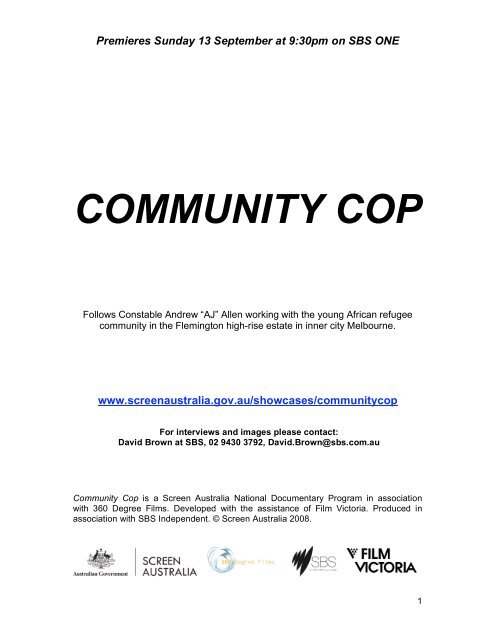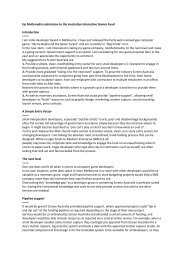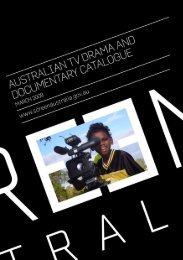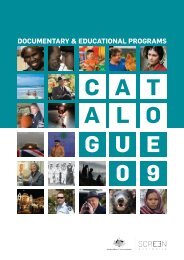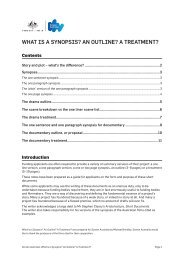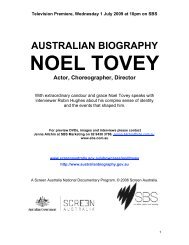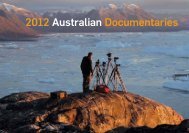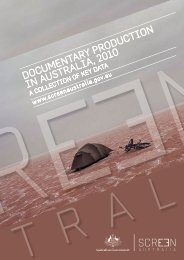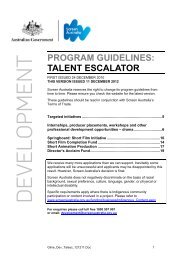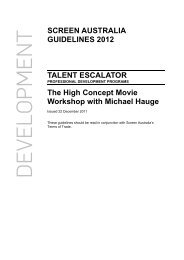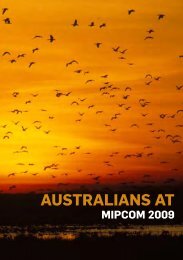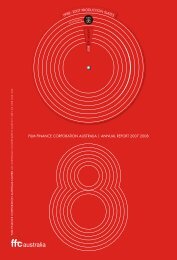COMMUNITY COP - Screen Australia
COMMUNITY COP - Screen Australia
COMMUNITY COP - Screen Australia
Create successful ePaper yourself
Turn your PDF publications into a flip-book with our unique Google optimized e-Paper software.
Premieres Sunday 13 September at 9:30pm on SBS ONE<br />
<strong>COMMUNITY</strong> <strong>COP</strong><br />
Follows Constable Andrew “AJ” Allen working with the young African refugee<br />
community in the Flemington high-rise estate in inner city Melbourne.<br />
www.screenaustralia.gov.au/showcases/communitycop<br />
For interviews and images please contact:<br />
David Brown at SBS, 02 9430 3792, David.Brown@sbs.com.au<br />
Community Cop is a <strong>Screen</strong> <strong>Australia</strong> National Documentary Program in association<br />
with 360 Degree Films. Developed with the assistance of Film Victoria. Produced in<br />
association with SBS Independent. © <strong>Screen</strong> <strong>Australia</strong> 2008.<br />
1
Premieres Sunday 13 September at 9:30pm on SBS ONE<br />
Key Credits<br />
Featuring – Constable Andrew Allen, Ahmed Ahmed, Ahmed Dini<br />
Producer – Sally Ingleton<br />
Director – Helen Gaynor<br />
Editors – Ben Eriksen, Peter Friedrichs<br />
Camera – Helen Gaynor, Peter Zakharov<br />
Sound – Chris Izzard, Mark Tarpey, Peter Graham, Ben Banks<br />
Production Managers - Kirrilly Brentnall, Kate Pappas<br />
Music – Group 120 - Erin Baker, Yung Philly, Camilo Martin, Jay Taranto, Asmeret<br />
Tikue, Aaron Stephanus, Jonathon Guigan<br />
Music Producer - Burkhard Dallwitz<br />
Narrator – Petra Kalive<br />
Executive Producer – Anna Grieve<br />
Duration – 52 minutes<br />
Website – www.screenaustralia.gov.au/showcases/communitycop<br />
Community Cop is a <strong>Screen</strong> <strong>Australia</strong> National Documentary Program in association<br />
with 360 Degree Films. Developed with the assistance of Film Victoria. Produced in<br />
association with SBS Independent. © <strong>Screen</strong> <strong>Australia</strong> 2008.<br />
2
Premieres Sunday 13 September at 9:30pm on SBS ONE<br />
Synopses<br />
One line<br />
On one of the toughest beats in town, a cop lays down his gun and takes up a new style<br />
of policing.<br />
One paragraph<br />
On one of the toughest beats in town, a cop lays down his gun and takes up a new style<br />
of policing. Community Cop follows Constable Andrew “AJ” Allen working with the young<br />
African refugee community in the Flemington high-rise estate in inner city Melbourne.<br />
One page<br />
On one of the toughest beats in town, a cop lays down his gun and takes up a new style<br />
of policing. Community Cop follows Constable Andrew “AJ” Allen working with the young<br />
African refugee community in the Flemington high-rise estate in inner city Melbourne.<br />
The estate is home to 4000 people, many of them from war-torn Somalia, Eritrea and<br />
Ethiopia. It is a diverse, volatile and complex neighbourhood with a history of high crime,<br />
tough policing, and escalating clashes between the police and young people who often<br />
see police as the enemy.<br />
With limited resources but assistance from key community members including youth<br />
worker Ahmed Ahmed and youth ‘troublemaker’ turned advocate Ahmed Dini, AJ sets<br />
out to earn the trust of this suspicious community. It is a tough job, when some even<br />
within his own ranks regard this community policing as a waste of time and money.<br />
3
Premieres Sunday 13 September at 9:30pm on SBS ONE<br />
Production Story<br />
The way director Helen Gaynor puts it, making a film like Community Cop is like holding<br />
the tip of a tiger’s tail as the tiger is running around.<br />
“You feel like you might lose your grip at any moment and you just have to try to hang on<br />
for dear life and go wherever it goes,” she says, laughing.<br />
Gaynor, who wrote, directed and shot the one-hour documentary, works by immersing<br />
herself in the world of her subjects; filming action as at unfolds, often unable to predict<br />
how a story will develop.<br />
Gaynor began researching Community Cop in early 2007 after discussing with producer<br />
Sally Ingleton, of 360 Degree Films, the possibility of making a film about the racism and<br />
misunderstanding experienced by young Muslims in <strong>Australia</strong>.<br />
The pair had successfully collaborated on an earlier documentary, Welcome 2 My Deaf<br />
World, and hoped to work together again.<br />
“What Helen loves doing, and does very well, is having the time to wander into<br />
environments with a camera and shoot things as they happen,” Ingleton says.<br />
“Helen came across the community policing program at Flemington high-rise estate,<br />
which is home to 4000 people, most of them from war-torn Somalia, Eritrea and<br />
Ethiopia.”<br />
The angle gave the filmmakers a chance to cover the story from two sides: that of a<br />
policeman who was trying to break the mould by policing in a very proactive way and a<br />
community struggling to prosper in a volatile and overcrowded government housing<br />
estate with a history of high crime and tough policing.<br />
“The Victoria Police media unit was extremely helpful although we had rigorous<br />
discussions about what the documentary might mean for the police force,” Gaynor says.<br />
“I told them that my work was ‘warts and all’ so I couldn’t promise that it would be a good<br />
story. They were happy for the public to know (and understand) what they do even if it<br />
wasn’t a squeaky clean picture.”<br />
Between October 2007 and March 2008, Gaynor immersed herself in the story, following<br />
the work of Constable Andrew “AJ” Allen as he settles into his new role as the<br />
community liaison officer based at Flemington, and capturing drama, tension, conflict<br />
and redemption as issues between the police and the community flare up and are<br />
resolved.<br />
She worked hard to gain the trust of the African-<strong>Australia</strong>n young men, and some<br />
perform in the rap song that opens the film. “These young men had a very rough ride<br />
with the mainstream media,” Gaynor says. “They feel very burnt by the media, but they<br />
were very generous in helping me and allowing me to spend a lot of time hanging<br />
around them with the camera.”<br />
4
Premieres Sunday 13 September at 9:30pm on SBS ONE<br />
In particular, Helen befriended Ahmed Dini, a young African man with a chequered past<br />
who is a strong advocate for youth on the estate. His trust helped her to gain the intimate<br />
access required for the film and to learn of events as they happened.<br />
“With this sort of filmmaking it is all about planning,” Gaynor says. “You talk to people,<br />
find out what’s on in the next few days, then strategise about where you should be. At<br />
the same time you keep an eye on the media to monitor things that are unpredictable<br />
and uncontrollable. I wasn’t on the spot when a lot of incidents actually happened, but<br />
we followed the behind-the-scenes action that you don’t see in the news. As soon as<br />
something happened I would go and be with AJ and the community members to catch<br />
their response.”<br />
Equally unpredictable was the certainty that a good film would emerge from six months<br />
of filming and 130 hours of footage.<br />
“There was always the risk of not having a good story at the end of it all. When I started,<br />
Leading Senior Constable Glenn Birt was going to be the main character and he got<br />
offered a position in the Northern Territory and suddenly he was leaving,” she says.<br />
“I didn’t know whether his replacement would make a good character in the film or<br />
whether they would allow me to follow them around with the camera. Fortunately AJ was<br />
a terrific character and it all worked.”<br />
There also was doubt about residents on the estate.<br />
“You never know for sure whether, after a month of filming, someone’s going to turn<br />
around and tell you to rack off, because they can of course. It’s a documentary; they are<br />
not being paid.”<br />
<strong>Screen</strong> <strong>Australia</strong>’s executive producer Anna Grieve is convinced the film will give the<br />
audience a powerful insight into the African community living on the estate revealing how<br />
many of the difficulties between police and community arise from misunderstanding and<br />
lack of resources”.<br />
“This is better than Law & Order or NCIS on a tough New York crime beat, what Helen<br />
has been able to capture is real life at the front line of policing. There are challenges for<br />
both sides… It’s difficult to be a cop in this community and its difficult to be a young<br />
African man living on the estate but both sides are working hard to understand each<br />
other,” Grieve says.<br />
The filmmakers will also be working with SBS and <strong>Screen</strong> <strong>Australia</strong> on a larger refugee<br />
website to accompany the documentary, featuring a whole range of refugee stories from<br />
a number of communities and music.<br />
Gaynor hopes the film will make the audience consider the role of police, by showing a<br />
largely unknown but effective form of policing.<br />
“I also hope that people will embrace the African-<strong>Australia</strong>n community as fellow<br />
<strong>Australia</strong>ns and fellow human beings,” Gaynor says.<br />
5
Premieres Sunday 13 September at 9:30pm on SBS ONE<br />
“I think the mainstream media has fed a lot of misconception and prejudice, which has<br />
made an already difficult process for these people even more difficult.<br />
“A lot of these kids have been here for much longer than they were in the countries that<br />
they’ve fled. It’s very hard for them when they keep getting treated as different. Mostly<br />
they’re just bored teenagers.”<br />
Ingleton concurs: “The story is set in inner city Melbourne but it could be in inner-city<br />
Sydney, Perth or anywhere in <strong>Australia</strong>. I hope that audiences will get an insight into<br />
what goes on in the life of a young African kid, who has come here from war-torn<br />
Somalia or Eritrea. They just want access to normal things, they want to be treated as<br />
equals and to be respected.”<br />
6
Premieres Sunday 13 September at 9:30pm on SBS ONE<br />
Director Helen Gaynor writes about the background of the estate<br />
and community policing.<br />
The Flemington Public Housing Estate in inner city Melbourne was built in the 1960s,<br />
part of what the police call “the triangle”, with similar estates built in neighbouring North<br />
Melbourne and Kensington. The estates have been first port of call for successive waves<br />
of immigrants to <strong>Australia</strong> – Italians, Greeks, Turks, Vietnamese and since the early<br />
1990s, people from the Horn of Africa. Most of the Africans have fled terrible wars in<br />
their own countries. Many of their children have grown up in <strong>Australia</strong> and the estate is<br />
their home.<br />
Flemington is also well known as the centre of the Spring Racing Carnival, one of the<br />
biggest events in Melbourne. Thousands of people flock to the Flemington Race Course<br />
in late spring, dressed to the nines and in a mood to party. The highlight of the carnival is<br />
the world renowned Melbourne Cup. The main street, Race Course Road is filled with<br />
race goers in their frocks and hats and suits mingling with African women in traditional<br />
dress and long flowing robes.<br />
The estate is also home to Anglo <strong>Australia</strong>ns, many on welfare. It attracts its fare share<br />
of drug dealers and ex-crooks. For the local police at Flemington Police Station, it is a<br />
heady mix.<br />
In late 2005 a spate of robberies occurred during the Spring Racing carnival. ‘Soft<br />
targets’ such as people who were drunk and older people were targeted by groups<br />
described by the victims as dark-skinned youths. Mobile phones were stolen and<br />
sometimes weapons like small knives were produced to persuade the hand over. The<br />
police cracked down on the local teenagers on the estate–searches were frequent and<br />
the public and the kids grew increasingly hostile to what they saw as constant<br />
harassment and racial profiling. They retaliated by throwing rocks and things went from<br />
bad to worse. There were fears that a riot would take place and so a public meeting was<br />
held at which the community voiced their anger at policing methods to senior members<br />
of the force, and members of the state government.<br />
The police responded by appointing a community liaison officer–the first in the state to<br />
be appointed to a specific police station. Leading Senior Constable Glenn Birt<br />
established the role and gradually the tension calmed and the community and police<br />
began to understand each other better. After two years, and a period of relative calm,<br />
tensions between police and estate youths were again on the rise. Leading Senior<br />
Constable Birt decided to move on and this is where our story begins.<br />
7
Premieres Sunday 13 September at 9:30pm on SBS ONE<br />
Interview with Constable Andrew “AJ” Allen<br />
When Constable Andrew “AJ” Allen began working as the Victoria Police community<br />
liaison officer in the inner Melbourne suburb of Flemington in late 2007, the job came<br />
with an unusual condition.<br />
For several months, AJ’s every move was to be filmed as part of the documentary<br />
Community Cop, an arrangement set up with his predecessor in the role, Constable<br />
Glenn Birt, and Inspector Nigel Howard, who developed the community policing initiative.<br />
Participating in the documentary—which follows AJ as he settles into his role and deals<br />
with issues that arise in the volatile, high-density Flemington housing estate where he<br />
spends up to 40 per cent of his time—proved intrusive.<br />
“I was new in the role and I was still feeling my way,” he says.<br />
“It was difficult at times to have the added pressure of having someone looking over my<br />
shoulder. But you do get used to it and you have to make allowances. Depending on<br />
who I was with, it could either be a negative or a positive. Some people would play up to<br />
the camera while others refused to be filmed at all.”<br />
In the long run, AJ hopes the film will help by educating people about the hardships<br />
faced by newly arrived <strong>Australia</strong>ns, particularly those who live at the high-rise estate.<br />
“We bring these people in and we give them somewhere to live but there’s no real<br />
infrastructure for the vast majority. There’s nothing for the youth to do and that’s where<br />
all the problems come from,” he says.<br />
“They don’t have any of the resources that most <strong>Australia</strong>ns take for granted and they<br />
are just really left to their own devices.”<br />
AJ, a former air force police officer who has served in some of the world’s toughest<br />
hotspots, has made “massive inroads” at the estate, with statistics showing a big<br />
reduction in antisocial behaviour among the estate’s youth. His presence has given the<br />
community confidence that its voice is being heard by the police.<br />
He hopes the film will open the eyes of fellow officers to the advantages of community<br />
policing—a concept many discredit.<br />
“You can get so tunnel-visioned when you are doing general-duties policing. You are<br />
very busy and you’ll get called to the estate because there’s been a theft, or criminal<br />
damage or domestic violence; you go in, you sort it out and you leave.<br />
“But when you have the opportunity to go into the community and spend some time, you<br />
understand that they’ve got nothing to do so they’re bored, and when the boredom kicks<br />
in, the stakes get higher about what they will do to keep themselves entertained. What<br />
starts out as a bit of boredom can escalate into a major problem.”<br />
8
Premieres Sunday 13 September at 9:30pm on SBS ONE<br />
Biographies<br />
Ahmed Ahmed<br />
Ahmed Ahmed was born in Somalia. He was holidaying with his sister at his uncle’s<br />
house when the war broke out in the early 1990s in Mogadishu.<br />
His father agreed that they should stay with the uncle until the fighting stopped which<br />
they all assumed would be in a few weeks.<br />
When it appeared that the fighting was not likely to stop for months or maybe years,<br />
Ahmed Ahmed moved with his uncle, cousins and sister to Egypt, where he attended<br />
school.<br />
As a teenager, he and his sister applied to come to <strong>Australia</strong> as refugees and were<br />
sponsored by friends of friends, who welcomed the pair into their home.<br />
He completed school at Debney Park High School and, after doing casual work at his<br />
local primary school decided to become a qualified youth worker.<br />
Now in his late 20s, Ahmed Ahmed works part-time with Jesuit Social Services as one of<br />
a team of youth workers on the Flemington housing estate, where he lives with his wife<br />
and two young daughters.<br />
Ahmed Dini<br />
Ahmed Dini was two years old when his mother fled from the war in Somalia with him<br />
and three siblings. With little Ahmed strapped to her back, she walked with her children<br />
more than 150 kms to reach the Kenyan border<br />
For the next few years the family lived a precarious life in refugee camps.<br />
At the age of eight, his family was accepted into <strong>Australia</strong> as part of the refugee program<br />
and settled in Victoria. Ahmed Dini attended Debney Park High School, completing his<br />
VCE three years ago. Now aged 20, he is enrolled in politics at Victoria University.<br />
In 2006 Ahmed Dini was named Moonee Valley Youth Citizen of the year for his work<br />
with the African community. He has received awards from Victoria Police and other<br />
organisations for his community work, and was nominated as Young Muslim of the Year<br />
in 2007. He was selected to be part of a training program for young Muslim leaders in<br />
the same year.<br />
Ahmed coaches the Flemington Eagles Under 18s soccer team. He lives at the North<br />
Melbourne housing estate with his parents and four siblings.<br />
9
Premieres Sunday 13 September at 9:30pm on SBS ONE<br />
About the filmmakers<br />
Sally Ingleton – Producer<br />
Sally Ingleton is a partner in 360 Degree Films and has been producing and directing<br />
award-winning documentaries for 20 years. Specialising in science, arts, history and<br />
social issues, she has made programs for the BBC, Channel 4, Discovery Channel,<br />
National Geographic, ABC Television, SBS Television and NHK.<br />
Sally’s recent work includes Seed Hunter and 2 Mums and a Dad, which won Best<br />
Documentary at the Sydney Film Festival Dendy Awards and Best Documentary at the<br />
<strong>Australia</strong>n Teachers of Media Awards. In 2006, Sally produced Welcome 2 My Deaf<br />
World, which was nominated for Best Documentary at both the <strong>Australia</strong>n Film Institute<br />
and <strong>Australia</strong>n Teacher’s of Media Awards. It won the most popular film at the Real Life<br />
on Film Documentary Film Festival Melbourne.<br />
Other credits include Muddy Waters: Life and Death on the Great Barrier Reef,<br />
which won the Jury Prize at Japan’s Festival Earth Vision and the Best<br />
Environment and Conservation Award at the Japanese Wildlife Film Festival;<br />
Painting Country, which won the Silver Chris Award at the Columbus Film Festival;<br />
Mao’s New Suit, which won Best Documentary at Chicago; and The Tenth Dancer,<br />
which screened at festivals around the world and won awards in Japan, Chicago and<br />
San Francisco. It also won Best Documentary at the 1994 <strong>Australia</strong>n Teachers of Media<br />
Awards.<br />
Sally is currently producing the international documentary Murder in the Snow for the<br />
BBC and SBS.<br />
Helen Gaynor – Director<br />
Helen Gaynor has been a director in documentary and drama for more than 20 years.<br />
After graduating from Swinburne Film and Television school, she was trained by ABC TV<br />
where she worked for several years, directing and producing everything from The 7.30<br />
Report to Countdown, and various television dramas, House Rules and Inside Running.<br />
She has produced, written and directed several documentaries including Impunidad,<br />
which won the Chris Award at Columbus Film Festival and a Silver Star at Chicago Film<br />
Festival; The Election of the Century, nominated for UN Peace Prize; For the Defence; A<br />
Little Inconvenience; Nurses; Welcome 2 My Deaf World and Community Cop.<br />
Her drama credits include The D-Generation, A Country Practice, Neighbours, Home<br />
and Away, Big Sky, High Fliers, Something in the Air, and MDA.<br />
She combines a career as a freelance drama director with documentary direction, and<br />
teaching.<br />
10
Premieres Sunday 13 September at 9:30pm on SBS ONE<br />
Anna Grieve – Executive Producer<br />
Anna Grieve has executive produced many award-winning documentaries and<br />
productions across a range of platforms since joining Film <strong>Australia</strong> in 2001. Her recent<br />
work includes the Hidden Treasures and The Art of War series with Betty Churcher, The<br />
Prime Minister is Missing, I’ll Call <strong>Australia</strong> Home, Rosa’s Journey, Community Cop,<br />
Dhakiyarr Vs the King, Silent Storm, Bruce Petty’s Human Contraptions series, Land of<br />
the Morning Star and the Logie Award winner Who Killed Dr Bogle & Mrs Chandler?<br />
Anna’s other productions as Executive Producer include the 10-part MobiDocs anthology<br />
produced with the National Film Board of Canada and the online productions Ceremony,<br />
Pacific Stories, and Moving History. Anna is responsible for the award-winning teaching<br />
resource <strong>Screen</strong> <strong>Australia</strong> Digital Learning which was a recent finalist in the 2008<br />
International Focal Awards in London.<br />
Prior to joining Film <strong>Australia</strong>, Anna worked as a producer/writer/director on a range of<br />
productions such as Federation and Myths of Childhood and directed documentaries<br />
including Pram Factory, Lake Pedder and Getting Even - Women in <strong>Australia</strong>n Politics.<br />
She is a former Film <strong>Australia</strong> and AFTRS Board member.<br />
11
Premieres Sunday 13 September at 9:30pm on SBS ONE<br />
References<br />
Community Cop showcase page<br />
www.screenaustralia.gov.au/showcases/communitycop<br />
360 Degree Films<br />
http://www.360degreefilms.com.au/<br />
African <strong>Australia</strong>n online resource<br />
http://www.africanoz.com.au<br />
Victoria Police<br />
http://www.police.vic.gov.au<br />
Jesuit Social Services<br />
http://www.jss.org.au<br />
Moonee Valley City Council<br />
http://www.mooneevalley.vic.gov.au<br />
Office of Housing<br />
http://www.housing.vic.gov.au<br />
Flemington and Kensington Community Website<br />
http://home.vicnet.net.au/~flemweb/<br />
Community Gardens - Sustainable Gardening <strong>Australia</strong><br />
http://www.sgaonline.org.au/info_communitygardens.html<br />
12


